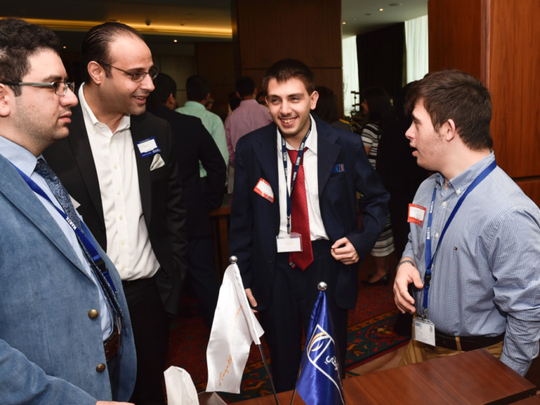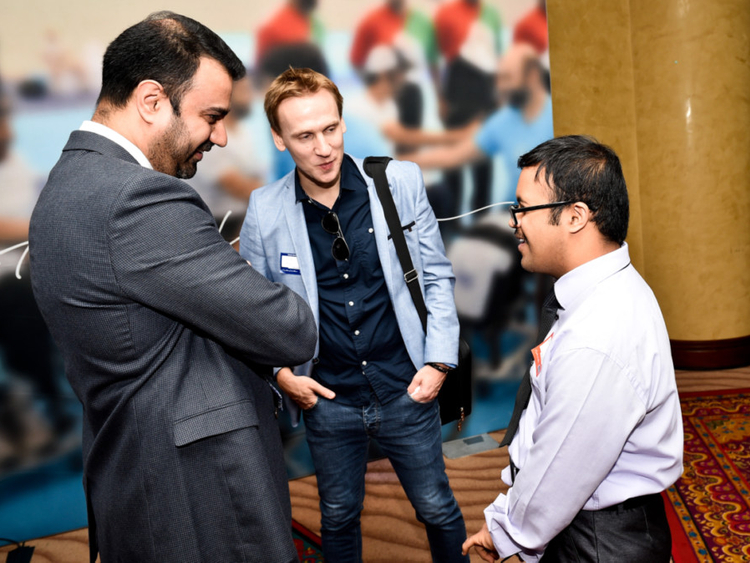
Dubai: Eight months ago when Bilal Haddah, a 20-year-old Syrian boy with Down’s syndrome, was going through a vocational training course, he was not exactly the type of person who would easily mingle with people. He was known to be shy, nervous when he had to attend his first job interviews, and felt quickly uncomfortable in certain situations.
After completing his training and landing a job as a customer service employee at an ice cream shop, Haddah now finds ultimate pleasure in interacting and serving ice cream to his customers every day.
“Haddah feels like everybody else and does his job very well. He feels like he is part of society,” his employer, Patricia Borja, general manager of Ella’s Creamery, told Gulf News. She said the experience of hiring him has encouraged her to look for more people with the same ambitions like him.
It’s not only Haddah who was given a chance to discover his hidden talents. Sixteen other people with cognitive disabilities have also been successfully integrated into their new employment positions in banks, insurance companies, hotels and many more places with the help of an initiative launched by Emirates NBD to drive their workplace inclusion in the UAE.
The Careers Network initiative, in partnership with the Community Development Authority (CDA), Manzil, Sustainable Square and other private sector companies, was launched a year ago with an aim of providing sustainable employment for people with cognitive disabilities, who after the age of 18 are forced to leave the specialised centres that offer management and care.
The programme has been assisting their partners in the private sector with the selection, hiring and training of potential employees, in addition to assisting employers in enhancing their ability for workplace inclusion.
On Tuesday, during a function held by the bank, around 25 new candidates were brought together to network with employers from 30 companies. Those who were already hired, including their families, also attended to share their experiences.
Ismail Abdul Rahman, from India, who has autism, got his first job as a marketing executive in Solanki Interiors International, and he says the job has helped him improve his communication skills. “My ambition is to learn as much as I can in the least possible time. I’m better at talking with people, previously I had to get in contact with hotels, I became better with communicating since I got the job,” he said.
Sami Khalil, an Egyptian boy with global development delay, a condition that occurs during the developmental period of a child between birth and 18 years denoted by a lower intellectual functioning, found his passion in working in a hotel’s laundry department.
“I have been with Pullman Dubai Creek City Centre for six months,” he said. “I love the work. I do a lot and my boss supports me so much,” said Khalil, who has been with Manzil Centre and got his vocational training in Jumeirah Creek-side hotel before landing his job.
Nadine O’Connor, housekeeping business excellence and CSR manager at Jumeirah Creek-side hotel, said two years ago, they employed a boy with a similar disability to Khalil at their hotel and the practice positively impacted the business’ results.
“Nadeem [who was hired] is working with the laundry team at our hotel and is a fantastic worker. Nadeem has brought a wealth of energy into the team since he joined. As a result of inclusion, we’ve seen lower turnover, higher engagement scores from our colleague’s opinion surveys and that’s helping us get better customer results and, of course, more profits for the company.”
O’Connor said some companies are reluctant to hire people with disabilities. “They have misconceptions, they might think this person can’t communicate or do a task, but the spectrum of disabilities is so big that there are right fits out there.”
Families also feel that inclusion of people with disabilities in the workplace helps. Maham Saddique, who has a brother who is autistic, says three months since her brother started working in an insurance company in the HR department, they’ve noticed major changes in his character.
“He has become more mature, calm and more disciplined. He has always wanted to have a job like everyone else.”
“It is important for these individuals to be part of the community and society and to be given the fair and right opportunity like everyone else to earn their own livelihood and becoming financially independent,” said Mariam Bahlooq, executive vice-president of HR - Business Partnerships, Emirates NBD.
“We are aiming to hire around 50 people within the private sector; our goal is to find them sustainable employment and not only to give them roles. We are carving the right jobs suitable for them.”
Why employ people with disabilities?
People with disabilities represent a talented, untapped labour market.
Improves corporate culture.
Benefits the bottom line.
It is responsive to government guidelines and broader employment trends toward more inclusive workplaces.
Finding talented people with disabilities is getting easier all the time.
Lower attrition among people with disabilities.
Source: Emirates NBD









